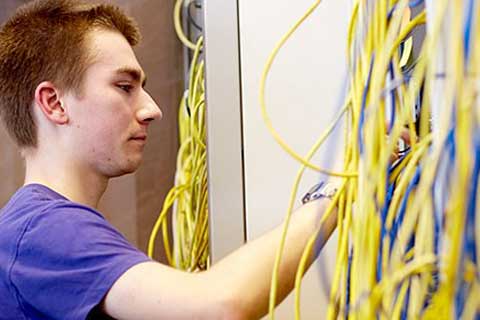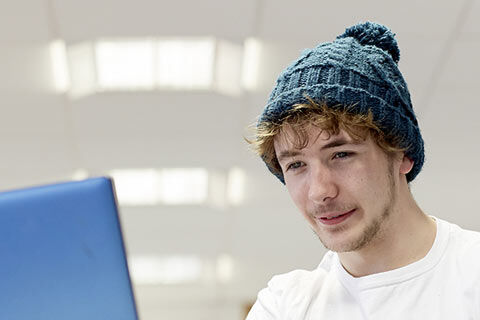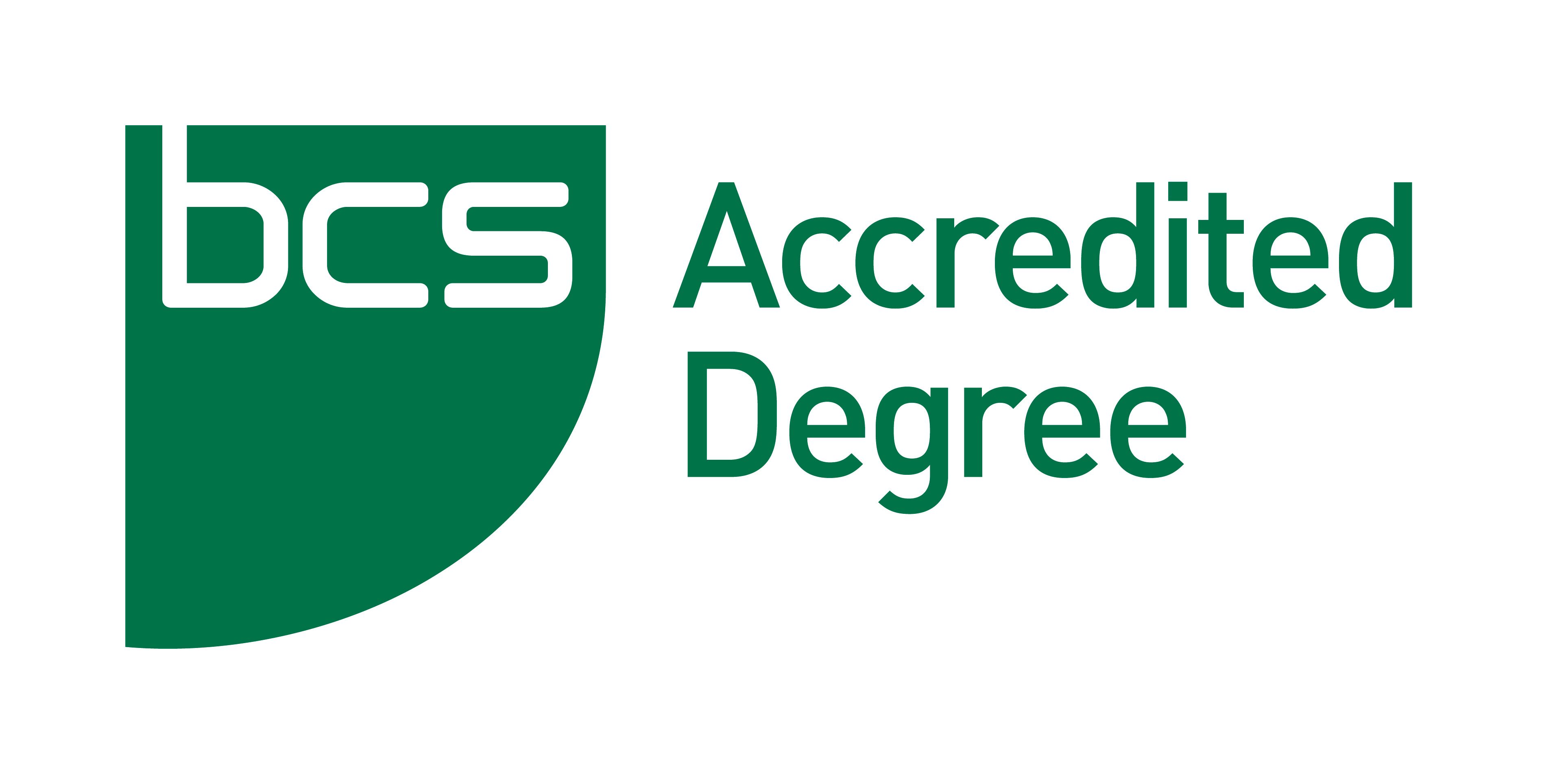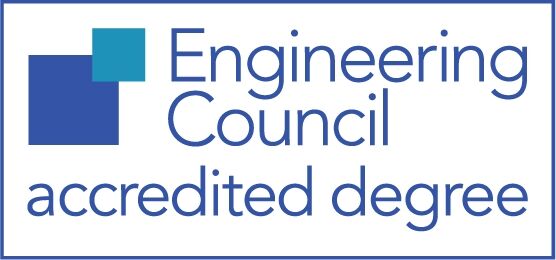
Big Data Analytics - MSc
Currently viewing course to start in 2024/25 Entry. Switch to 2025/26 Entry
The MSc Big Data Analytics course will provide you with an insight into areas of data mining, big data management, and advanced statistics. You will develop in-depth practical skills through using tools and techniques from the forefront of the emerging field of data analytics. You will use these to effectively model complex organisational requirements and propose suitable solutions....
- Level Postgraduate Taught
- Study mode Full Time
- Award MSc
- Start date January 2025
- Fees View course fees
- Subject
- Location City Centre
This course is:
Open to International Students
Overview
The MSc Big Data Analytics course will provide you with an insight into areas of data mining, big data management, and advanced statistics. You will develop in-depth practical skills through using tools and techniques from the forefront of the emerging field of data analytics. You will use these to effectively model complex organisational requirements and propose suitable solutions.
What's covered in the course?
The demand for big data analysis and management is continually increasing in business and computer science. For companies it can provide valuable insights, and results such as increased market share, profitability, possible cost savings and procedural efficiency. This course will equip you with the necessary skills to exploit big data tools and methods in order to drive innovation and growth in modern global organisations and society.
The learning activities on this Masters in Data Analytics degree are designed to encourage and facilitate your ability to gain employment and sustain a professional career in data analytics - by building your confidence and skills through hands-on experience and structured feedback. The course combines formal lectures and tutor-led workshops with independent study. You will develop key analytical and problem-solving skills, and will gain an aptitude for research, academic writing, and time management.
Technology enhanced learning will be used through the provision of online resources and discussion forums. Teaching will be conducted in a work-related context: you will work collaboratively with tutors, researchers, and businesses to prepare you for employment. Potential careers for Big Data Analytics graduates include roles in data science, data warehousing, consultancy, data security and data administration.
Tailor your degree
The Professional Placement version of the course is optional and is offered as an alternative to the standard version of the course. This will allow you to complete a credit bearing, 20 week Professional Placement as an integral part of your Master’s Degree. The purpose of the Professional Placement is to improve your employability skills which will, through the placement experience, allow you to evidence your professional skills, attitudes and behaviours at the point of entry to the postgraduate job market.

Introducing STEAMhouse
STEAMhouse is a centre for technology, innovation, creative thinking, prototyping and business development. Our £70 million pound building is the home for all of our Computing courses.
Accredited By
This course is accredited by:
The course is very well structured and it helped me develop the skills required in the field of Data Science. The course was inclusive and involved theoretical concepts and practical real world scenarios. I enjoyed the application of Advanced Analytics, Machine Learning and Big data technologies which improved decision making and business skills. Every course module concluded with a practice assignment that allowed me to transfer the knowledge to real life learning. The faculty was extremely supportive, always approachable and very helpful in providing timely feedback and directions to sharpen my skillsets.
Radhika Rajagopa
Why Choose Us?
-
Research-led, practice-driven teaching - Our teaching is underpinned by our versatile research projects and strong industry links.
-
Professional placement option - Gain desirable employability skills with the option of a professional placement.
-
Experienced academic staff - Our academic staff have extensive professional experience and are engaged with both the government and industry in helping to solve complex problems.
-
Excellent industry partnerships - Our previous students have gained work experience and graduate roles at companies such as: Hewlett-Packard, BT, Capgemini, Cisco, IBM and more.
-
Committed to enhancing graduates’ employability - We support students through continuing professional development and learning in a global environment.
- Established data analytics group- which can supervise PhD projects.
- Accredited by BCS, The Chartered Institute for IT - The course meets standards set by the profession.
OPEN DAY
Join us for a Virtual Open Event where you'll be able to learn about this course in detail, meet our subject academics and learn more about postgraduate finance, all from the comfort of your own home.
Next Event: 5 February 2025
Entry Requirements
Essential requirements
Essential Requirements
|
In order to be considered for a place on this course, you must have a 2:2 honours degree, or equivalent, in Computing or a computing-related subject with a substantial element of programming. |
Additional information for EU/International students
| Essential |
|---|
|
International applicants are required to have IELTS overall band of 6.0 or equivalent. |
If you have a qualification that is not listed, please contact us.
Fees & How to Apply
UK students
Annual and modular tuition fees shown are applicable to the first year of study. The University reserves the right to increase fees for subsequent years of study in line with increases in inflation (capped at 5%) or to reflect changes in Government funding policies or changes agreed by Parliament. View fees for continuing students.
Award: MSc
Starting: Jan 2025
- Mode
- Duration
- Fees
- Full Time
- 12 months
- £9,710 in 2024/25
- Full Time
- 18 months with Professional Placement (see below*)
- £10,685 in 2024/25
International students
Annual and modular tuition fees shown are applicable to the first year of study. The University reserves the right to increase fees for subsequent years of study in line with increases in inflation (capped at 5%) or to reflect changes in Government funding policies or changes agreed by Parliament. View fees for continuing students.
Award: MSc
Starting: Jan 2025
- Mode
- Duration
- Fees
- Full Time
- 12 months
- £17,710 in 2024/25
- Full Time
- 18 months with Professional Placement (see below*)
- £19,485 in 2024/25
Professional Placement option*
The Professional Placement option will allow you to complete a credit bearing, 20 week Professional Placement as an integral part of your Master’s Degree. The purpose of the Professional Placement is to improve your employability skills which will, through the placement experience, allow you to evidence your professional skills, attitudes and behaviours at the point of entry to the postgraduate job market. Furthermore, by completing the Professional Placement, you will be able to develop and enhance your understanding of the professional work environment, relevant to your chosen field of study, and reflect critically on your own professional skills development within the workplace.
You will be responsible for finding and securing your own placement. The University, however, will draw on its extensive network of local, regional and national employers to support you in finding a suitable placement to complement your chosen area of study. You will also benefit from support sessions delivered by Careers+ as well as advice and guidance from your School.
Placements will only be confirmed following a competitive, employer-led selection process, therefore the University will not be able to guarantee placements for students who have registered for the ‘with Professional Placement’ course. All students who do not find a suitable placement or do not pass the competitive selection process will be automatically transferred back to the standard, non-placement version of the course.
Personal statement
You’ll need to submit a personal statement as part of your application for this course. This will need to highlight your passion for postgraduate study – and your chosen course – as well as your personal skills and experience, academic success, and any other factors that will support your application for further study.
If you are applying for a stand alone module, please include the title of the module you want to study in your Personal Statement.
Not sure what to include? We’re here to help – take a look at our top tips for writing personal statements and download our free postgraduate personal statement guide for further advice and examples from real students.
Course in Depth
Module
In order to complete this course a student must successfully complete all the following CORE modules (totalling 180 credits):
As technological advances accelerate development and revolutionise the shape of our future, businesses and individuals compete ever so vigorously to maximise their efficiency. The competition involves cutting costs and making data-informed decisions. Also, the nature of data itself is evolving with the arrival of new technologies such as the Internet of Things (IoT). In fact, at its extreme, even the entire working or living environment can be treated as data: natural evolution is a well-established scientific theory that supports such a notion.
Information from data is required by many organisations and this module focuses on the application of statistical techniques to data sets primary using statistical and data analytics software. Hence a mixed learning and teaching approach is proposed that consists of both computer lab work with applying theory in practice through the use of specialist software and interactive taught sessions in a seminar room where you can work together putting theory into organisational context.
Within this module, you will gain knowledge and experience of advanced concepts of database systems and implementation techniques of database management systems. The module begins with reviewing the fundamental concepts necessary for designing, using, and implementing relational database systems. This includes conceptual design, relational modelling, Structured Query language (SQL) programming and database implementation techniques. The module then explores some of the advanced concepts of databases relevant to the role of database administrator. This includes query planning and optimization; transaction processing and concurrency control; and big data technologies. The objective is to enhance the comprehension and the advanced use of database system in order to optimize its performance. In addition, the module contains a substantial practical element utilising advanced SQL, NoSQL, enabling students to gain transferable skills in designing and developing relatively complex ‘real life’ database applications.
This module focuses on aspects of managing big data systems with respect to the five V’s (Volume, Velocity, Variety, Veracity, and Valence); i.e. systems that provide operational capabilities for realtime, interactive workloads where data is primarily captured and stored to support any analytical capabilities.
Big Data has driven the creation of new technology architectures with the likes of NoSQL, MPP databases and Hadoop that enable new types of products and services. Operational systems, such as the NoSQL databases, focus on servicing highly concurrent requests while exhibiting low latency for responses operating on highly selective access criteria.
Data mining is the non-trivial process of finding patterns and building models from data stored in data repositories such as databases and data warehouses. At the heart of Big Data Analytics and business intelligence, data mining algorithms provide readily available solutions to many Big Data problems. Data mining is an established field that provides both predictive and descriptive analytics solutions. Such solutions are often generic and can be applied to a wide range of applications from business to scientific and governmental applications.
In this module, you will be taught the internal mechanisms of developing descriptive and predictive data mining methods. Also you will be taught how to use modern data mining tools to build and numerically validate models and patterns extracted from data. You also will be able to critically evaluate current trends in data mining.
The exponential growth of social media has transformed the social, political, and technological landscapes. An increasing amount of data is generated from today’s social sites such as Twitter, Facebook, and YouTube. People use social media to publish rich content, annotate it with descriptive metadata, communicate and respond to each other. Data analytics is a powerful tool to identify trends and patterns in social media and explore how social media have been used in times of disasters, crisis or during important events such as political campaigns. This course is multidiscipline that combines social network analysis (SNA), natural language processing, and data analytics for mining social data. We aim in this course to understand an end-to-end process of social media analytics starting form data collection to extracting insights and deriving conclusions.
The purpose of the module is to enable you to undertake a sustained, in-depth and research-informed Level 7 project exploring an area that is of personal interest to you. In agreement with your supervisor, you will decide upon your topic which will take the form of a practical outcome (artefact) with accompanying contextual material. The main consideration when choosing your topic is that it must be aligned to the programme you are studying and informed by the research strategy of your school, and you should consider the relevance of this topic to your future academic or professional development.
Professional Placement (optional)
In order to qualify for the award of MSc Big Data Analytics with Professional Placement, a student must successfully complete all of the Level 7 modules listed above as well as the following Level 6 module.
This module is designed to provide you with the opportunity to undertake a credit bearing, 20-week Professional Placement as an integral part of your Master’s Degree.
The purpose of the Professional Placement is to improve your employability skills which will, through the placement experience, allow you to evidence your professional skills, attitudes and behaviours at the point of entry to the postgraduate job market. Furthermore, by completing the Professional Placement, you will be able to develop and enhance your understanding of the professional work environment, relevant to your chosen field of study, and reflect critically on your own professional skills development within the workplace.
Download course specification
Download nowCourse breakdown
The MSc programme is normally studied over one year full-time or two years part-time (one year and one term full-time for January start). You may move between full and part-time modes of attendance. The course is divided into taught modules of 20 credits and a Masters project of 60 credits. Students complete 60 credits for Postgraduate Certificate, 120 credits for Postgraduate Diploma and 180 credits for the full MSc. Each credit represents 10 notional hours of student learning and assessment. The structure of the course, the module, levels and credit ratings and the awards that can be gained are shown below.
A range of assessment methods are employed, assessment criteria being published in each assignment brief. Knowledge and skills are assessed, formatively and summatively, by a number of methods: coursework, examinations (seen and unseen, open and closed-book), presentations, practical assignments, vivas, online forums, podcasts and project work.
This course is accredited by the following organisations:
Our accreditations from these bodies show employers that you have the level of knowledge and skills they need when you graduate.

BCS, The Chartered Institute for IT
This degree has been accredited by BCS, The Chartered Institute for IT. Accreditation is a mark of assurance that the degree meets the standards set by BCS. An accredited degree entitles you to professional membership of BCS, which is an important part of the criteria for achieving Chartered IT Professional (CITP) status through the Institute. Some employers recruit preferentially from accredited degrees, and an accredited degree is likely to be recognised by other countries that are signatories to international accords.

Engineering Council Accredited Degree
This degree has been accredited by BCS, The Chartered Institute for IT on behalf of the Engineering Council. Accreditation is a mark of assurance that the degree meets the standards set by the Engineering Council in the UK Standard for Professional Engineering Competence (UK-SPEC). An accredited degree will provide you with some or all of the underpinning knowledge, understanding and skills for eventual registration as an Incorporated (IEng) or Chartered Engineer (CEng). Some employers recruit preferentially from accredited degrees, and an accredited degree is likely to be recognised by other countries that are signatories to international accords.
Employability
Enhancing your employability
This course is suitable for undergraduates and those who have worked in the industry but do not have the recognised qualifications.
The school boasts graduates who have gone on to work for Hewlett Packard, Bell Micro, Birmingham City Council, BT, Cap Gemini, Cisco, Deloitte, Ericsson, Fujitsu, IBM, Intel Corporation, NHS, Motorola, National Express, NEC, Royal Mail, Shell IT, JP Morgan Chase and Co, Carillion plc, Siemens and Nokia and many more.
Placements
The School has exceptionally strong links with industry. Collaboration with industry is at the heart of our teaching, enabling us to keep our courses relevant and up-to-date and putting you in prime position for industrial placements, chances to contribute to real-life projects and career opportunities.
International
Birmingham City University is a vibrant and multicultural university in the heart of a modern and diverse city. We welcome many international students every year – there are currently students from more than 80 countries among our student community.
The University is conveniently placed, with Birmingham International Airport nearby and first-rate transport connections to London and the rest of the UK.
Our international pages contain a wealth of information for international students who are considering applying to study here, including:
- Details of the entry requirements for our courses
- Some of the good reasons why you should study here
- How to improve your language skills before starting your studies
- Information relevant to applicants from your country
- Where to find financial support for your studies.
Facilities & Staff
Our Facilities
We are constantly investing in our estate and are currently in the process of spending £260 million on new learning facilities. This course will be taught at Millennium Point at the City Centre Campus.
The course is supported with a wide range of cutting-edge facilities in the City Centre Campus. We have a state-of-the-art computer games technology lab which contains high-performance PCs, Sony PlayStation development kits and a range of industry standard software including Unity, Unreal and a suite of professional Microsoft development tools.
We also have many open access areas where students can study together and even hire out laptops for use in these spaces and others within the university.
Within the University there are many internationally recognised research teams giving you the opportunity to collaborate with them on exciting interdisciplinary projects.

Computer networking
The laboratories are well-equipped for all our computer networking courses, as well as specialist areas for practical work such as voice-over internet protocol (VoIP), forensic and ethical hacking technologies, wireless and mobile technologies and radio frequency identification technologies to name but a few.

Software development and computer programming
There are a number of open access, software development and computer programming laboratories that can be used to develop systems and programmes, including database management systems such as MySQL, to name but a few.

Systems laboratories
Our embedded systems laboratories are used to develop real-time systems, such as specialist hardware training and development resources, and industrial-standard software development and simulation tools. These include microcontroller software and robotics design and development, to name but a few.

Electronic systems
To underpin the basic principles of electronic systems, we have a well-equipped laboratory of general and specialist test and measurement kits, including powered prototyping development boards, dual power supplies, frequency generators and counters and digital multi-meters to name but a few.
Forensic computing
Our successful development of forensic computing has led to a specialist forensics laboratory that is fully equipped with essential hardware and software for this sensitive area of study. The laboratory includes high-spec PCs with built-in multi interface Tableau write blockers, EnCase and FTK computer forensic software and steganography detection and analysis software, to name but a few.



